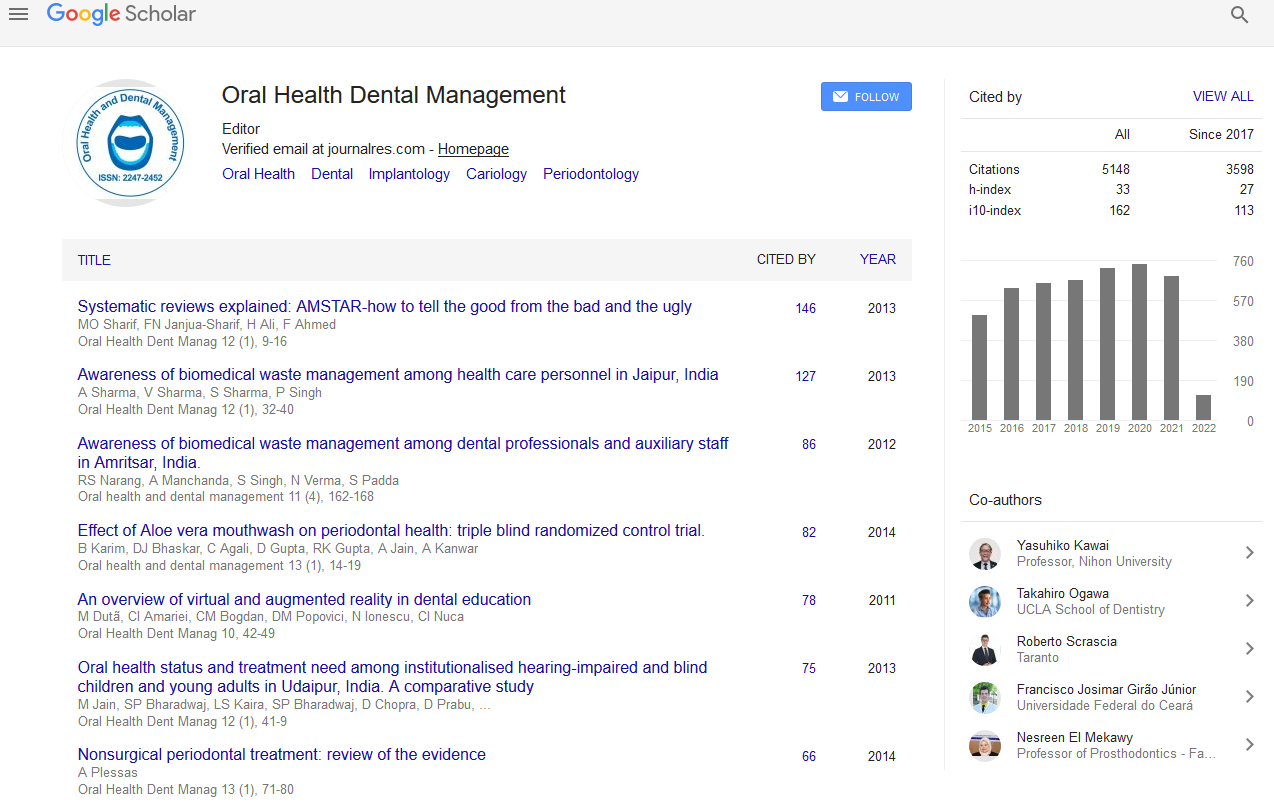Indexed In
- The Global Impact Factor (GIF)
- CiteFactor
- Electronic Journals Library
- RefSeek
- Hamdard University
- EBSCO A-Z
- Virtual Library of Biology (vifabio)
- International committee of medical journals editors (ICMJE)
- Google Scholar
Useful Links
Share This Page
Journal Flyer

Open Access Journals
- Agri and Aquaculture
- Biochemistry
- Bioinformatics & Systems Biology
- Business & Management
- Chemistry
- Clinical Sciences
- Engineering
- Food & Nutrition
- General Science
- Genetics & Molecular Biology
- Immunology & Microbiology
- Medical Sciences
- Neuroscience & Psychology
- Nursing & Health Care
- Pharmaceutical Sciences
Abstract
Denture Treatment Improves Oral Discomfort Accompanying Dry Sensation
Masako Banka, Noriyuki Hoshi, Makiko Saita, Atsushi Kuwabara, Yusuke Arai, Akinori Ohno, Tomonari Kumasaka, Katsuichiro Maruo, Suguru Kimoto, Yasuhiko Kawai and Katsuhiko Kimoto
Aim: In recent years, the number of patients complaining of symptoms of oral discomfort such as dry mouth, tongue pain, and burning sensation of the mouth has been increasing. This study aimed to determine whether denture treatment improved oral discomfort accompanying dry and sticky sensations. Methods: Forty-eight partial and/or complete denture wearers complaining of oral discomfort were recruited from non-xerogenic patients with normal salivary flow after obtaining informed consent. Measurement outcomes were: 1) subjective symptoms evaluated by self-administered questionnaire, including five questions on oral discomfort; 2) objective symptoms such as congestion and erosion of the tongue, erosion and congestion of the palate, and angular stomatitis evaluated by one dentist; and 3) unstimulated and stimulated salivary flow rates. Outcomes were evaluated before and after denture treatment. Mean differences in outcomes between before and after denture treatment were analyzed by Wilcoxon signed-rank test, then multiple regression analysis was applied to determine predictive variables associated with each score. Results: All outcomes were improved by denture treatment. Both unstimulated and stimulated salivary flow rates were significantly increased (p=0.042, p=0.014). Multiple regression analysis revealed that new denture fabrication improved stimulated salivary flow much more than only adjustment of the existing denture, and stimulated salivary flow significantly reduced objective symptoms (p=0.020), and sensations of dryness (p=0.010), pain or burning in the mouth (p=0.029). Conclusions: The results suggest that denture treatment improves salivary flow and reduces oral discomfort.

